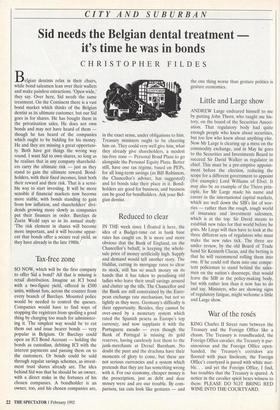Reduced to clear
IN THE week since I floated it here, the idea of a Budget-time cut in bank base rates has caught on. It is more and more obvious that the Bank of England, on the Chancellor's behalf, is keeping the whole- sale price of money artificially high. Supply and demand would tell another story. The Halifax, cutting its mortgage rates to clear its stock, still has so much money on its hands that it has taken to penalising old ladies who leave their small savings around and clutter up the tills. The Chancellor and the Bank are still constrained by the Euro- pean exchange rate mechanism, but not so tightly as they were. Germany's difficulty is their opportunity. Besides, they cannot be over-awed by a monetary system which rated the Spanish peseta as Europe's top currency, and now supplants it with the Portuguese escudo — even though the Bank of Portugal is missing its gold reserves, having carelessly lent them to the junk-merchants at Drexel Burnham. No doubt the punt and the drachma have their moments of glory to come, but these are not serious currencies and a system which pretends that they are has something wrong with it. For our economy, cheaper money is the prescription, just as debt and dear money were and are our trouble. By com- parison, tax cuts look like gestures — and the one thing worse than gesture politics is gesture economics.


















































 Previous page
Previous page